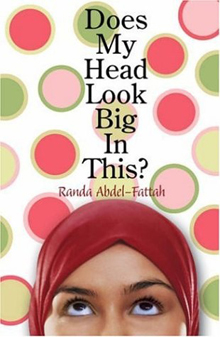Review of Does my head look big in this? Randa Abdel-Fattah

My daughter is 14 years old and facing the usual issues of identity, as well as being a Christian in a public high school. I asked at a bookstore for recommendations of "coming of age" books for girls, and she suggested Does my head look big in this? At first I hesitated, realising that it was about a Muslim girl.
However, I am very glad I eventually gave it to my daughter to read, because it is astonishingly relevant to Christians as well. The choices that 16-year-old Amal makes are more about being counter-cultural rather than being religious.
Amal, as a Muslim girl who wants to show her devotion to Allah, decides to wear the scarf as a faith statement, facing opposition from her school principal (it's not uniform), her parents (frightened that she might face persecution), and students at school (who link the hijab with Islam and therefore terrorism).
However, it is her faith's moral code, especially in terms of sexual purity, which causes more issues for her and her friends. The friends cannot understand that not wanting to kiss a boy, is not rejection, or just plain weird. They certainly do not make the connection with faith, and cannot understand the desire to live by a code, when it seems to restrict free expression of feelings.
The author admits that this award-winning book is very autobiographical. Like Amal she attended a Catholic primary school and an Islamic High School (although Amal attends a private school for her final two years of schooling). Abdel-Fattah also has Palestinian heritage, and she became the lawyer that Amal wants to be.
"It became apparent to me that the only time Muslim females appeared as heroines in books were as escapees of the Taliban, victims of an honour killing, or subjects of the Saudi royalty! I wrote Does my head look big in this? because I wanted to fill that gap. I wanted to write a book which debunked the common misconceptions about Muslims and which allowed readers to enter the world of the average Muslim teenage girl and see past the headlines and stereotypes - to realise that she was experiencing the same dramas and challenges of adolescence as her non-Muslim peers - and have a giggle in the process," explains Abdel-Fattah on her website.
It is the humour of the book that allows it to sell the message with a velvet glove, rather than an iron fist.
There are many ways that this book is also useful for a Christian audience, especially young adults:
"¢ It is a useful introduction to the Muslim faith, albeit a fairly liberal Muslim faith
"¢ It is helpful to have someone talk about the struggles of being religiously faithful when that lifestyle is so different to the prevailing culture
"¢ Some of Amal's conversations: with the more religiously strict Muslim parents of her close friend; and with her Catholic neighbour, and with her agnostic and atheist fellow students, are great insights into inter-faith dialogue.
Abdel-Fattah has received some criticism from Islamic groups, including comments on Islamic parenting websites that it is more a cultural book rather than being true to Islam. There is also criticism that Abdel-Fattah herself does not wear the hijab.
One more disappointing aspect, many of the adults in the book are caricatures rather than real people, and often teenagers are portrayed as showing better judgment. However, the book is written purely from the teen viewpoint.
Ultimately Muslim teens face many of the same challenges as Christian teens: how much of your faith do you want to be transparent to your non-religious friends? How do you make difficult choices? Who helps you to make major decisions, and who will support you once you have made your decisions?
While this book has some great insights into the Muslim world, we need to recognise that there is a wide spectrum of belief and faith within that worldview.
However, the more we know, the more we can understand.
What struck me most was the powerful addition for Christian teens of having personal access to the word of God (Amal's faith education is mediated through her parents and the mosque); and personal relationship with God, Jesus and the Spirit; as well as the encouragement and structure of our youth groups and fellowships and mentors within the church family.
My daughter loved the book: she thought it was one of the best she had read this year, because it encouraged her to be herself and not be embarrassed, and to publicly show her love for God and not be ashamed.
KARA MARTIN is a lecturer with School of Christian Studies (www.socs.org.au), and is an avid reader and book group attendee. Kara does book reviews for Hope 1032's Open House (www.theopenhouse.net.au).

























